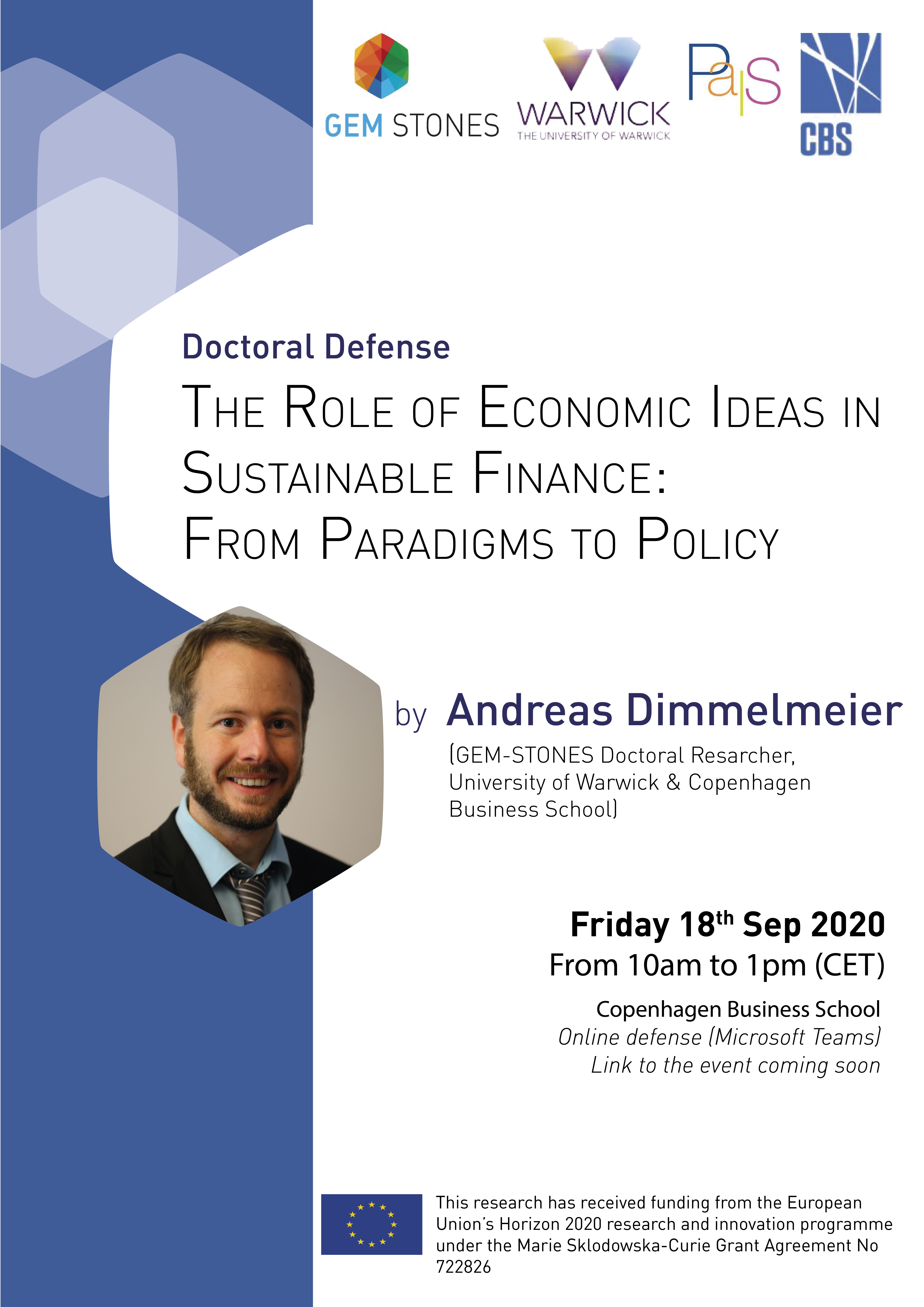Doctoral defence of Andreas Dimmelmeier
10:00 - 12:00
Public Doctoral Defense of Andreas Dimmelmeir (University of Warwick/CBS)
on "The Role of Economic Ideas in Sustainable Finance: From Paradigms to Policy"
 GEM-STONES Doctoral fellow Andreas Dimmelmeier (University of Warwick & Copenhagen Business School) will publicly defend his thesis entitled:
GEM-STONES Doctoral fellow Andreas Dimmelmeier (University of Warwick & Copenhagen Business School) will publicly defend his thesis entitled:
THE ROLE OF ECONOMIC IDEAS IN SUSTAINABLE FINANCE: FROM PARADIGMS TO POLICY
Date & Time: Friday 18th of September 2020, 10:00-12:00 CET
Location: Online event on Microsoft Teams, organised by Copenhagen Business School
*Please note in connection with the online defense that the microphone and camera of all spectators must be turned off
Link to the event: https://teams.microsoft.com/l/meetup-join/19%3ameeting_YzMyZmNiMmUtOGI4Ni00N2JjLWEzMWUtY2ExYzM4OTcxNDhl%40thread.v2/0?context=%7b%22Tid%22%3a%22875c414e-5d00-4cdb-b77a-deae5d6ab201%22%2c%22Oid%22%3a%22d3ea3b16-74b1-4180-abbe-2a6581d46bdb%22%7d
Abstract
This thesis investigates how economic ideas have shaped the evolution of sustainable finance between 1998 and 2018. Sustainable finance has become an ever more salient topic as financial institutions, governments and central banks have looked for ways to integrate sustainability concerns. The thesis develops a transmission mechanism that outlines how ideas from economic theories influence the frames that are adopted by policy actors. The transmission of ideas is investigated through network analysis, content analysis, interviews and participant observation.
The thesis outlines four frames that actors utilise to conceptualise sustainable finance: (1) a socially responsible investment frame; (2) a risks and opportunities frame; (3) a climate finance frame; and (4) a critical frame. It finds that after an initial preoccupation with ethical questions, the most influential actors have framed sustainable finance in terms of risks and opportunities. The economic ideas that underpin most of these frames come from mainstream finance. Nonetheless, the recent emphasis on systemic risks has meant that actors like central banks have started to explore less orthodox ideas. With regards to transmission of frames to policy outcomes, the thesis finds that most of the debates have been about how to understand and implement a risks and opportunities approach. Importantly, the incorporation of economic ideas into the design of performative socio-technical instruments is a stronger transmission channel than the persuasion of policymakers.
The findings in the thesis contribute to constructivist International Political Economy. First, the proposed transmission mechanism clarifies how economic ideas affect policy in a non-linear manner. Second, the study of a case of evolution contributes to the understanding of ideational dynamics in non-crisis times. The thesis also adds to the literature on environmental politics since understanding the thinking of actors and the functioning of instruments allows for assessments of how sustainable finance will affect environmental outcomes.
Jury members:
Prof. André Broome (co-supervisor, University of Warwick)
Prof. Eleni Tsingou (co-supervisor, Copenhagen Business School)
Prof. Caroline Kuzemko (University of Warwick)
Prof. Lasse Folke Henriksen (Copenhagen Business School)
Prof. Andrew Baker (University of Sheffield)
















